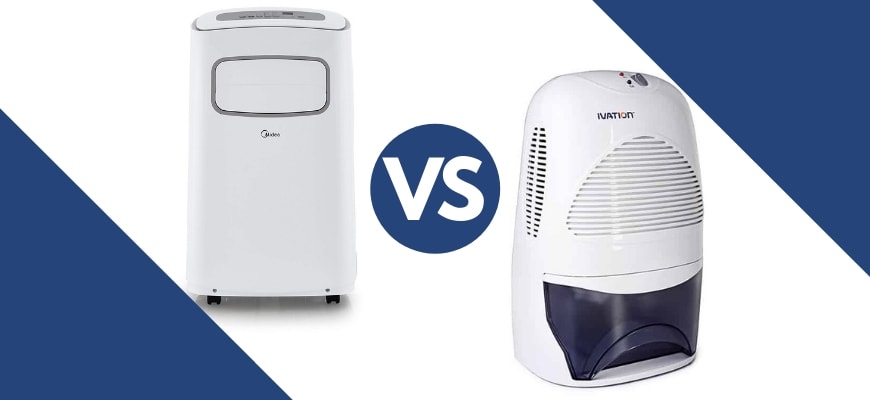There’s a lot of fancy gadgets around at the moment, and they all say they can do different things to make your life better. So, when you read about humidifiers and dehumidifiers it’s natural that there would be a little confusing when trying to figure out what the difference is and which one you need for your home.
Here’s a little information to help you learn more about each and decide on the one that you want.
Table of Contents
What is a Dehumidifier?
A dehumidifier is an electrical appliance, and it is used to reduce the amount of moisture in the air – also known as the humidity. In addition to this, it is also there to maintain humidity levels so that they stay at an acceptable level. That way, your home has balance and the air is easier to breathe.
It can be used in your household, workplace, or even for industrial purposes. They come in varying sizes as well, so you can have one that is tiny enough to fit into a caravan or one that is big enough to dehumidify a whole house. Of course, it’s usually best to settle for something a little smaller than that.
What is a Humidifier?
So, a humidifier is like a dehumidifier in reverse. Once again, it is an electrical appliance, but instead of removing moisture from the room it adds some. There are homes that are too dry, and the purpose of a humidifier is to provide extra moisture as well as maintain the optimum levels.
This device also comes in a number of different sizes, and you can buy one for pretty much every situation. Most of the time, you are likely to need one for a single room, so you only need a little one. Again, these can be used in caravans, homes, shops, or even large industrial buildings.
What Situations are They Used in?
The big question is, when do you actually need a humidifier or a dehumidifier? In this section, we will explore the uses for each of them in greater detail to give you a better understanding of how each of them works.
If a home has too much moisture, it becomes the perfect breeding ground for mould and mildew as well as dust mites.
The issue with this is that they are a major cause of allergies as well as a trigger for asthma. For healthy people, there tend to be no symptoms when exposed to either of these things.
However, those who are allergic or have asthma are likely to experience itchiness, coughing, wheezing, and shortness of breath. This reaction can become so severe that they end up hospitalised or, in very severe cases, it can lead to death. Of course, this is a very rare outcome, but it does happen.
Even a healthy person can become unwell if they are exposed to mould and mildew for extended periods of time.
This is because we inhale the spores around us, and they make their way into our lungs. The best way to prevent mould and mildew is by investing in a dehumidifier so that excess moisture can be extracted from the air.
This takes the ideal habitat away and discourages growth, leading to safer air that everyone can breathe without worrying. It also saves your walls from potential mould damage; especially in the bathroom where it is damp a lot.
If a home has too little moisture, the dry air can cause your skin to crack and become sore, but it may also cause itchiness, a sore throat, nosebleeds, and respiratory issues. This is because there is a delicate balance between too much humidity and too little.
Dry air can be damaging to our health, and while it is not as severe as the effects of mould, it’s worth noting all the same.
Having a humidifier means that you can increase the amount of water in the air so that you can achieve better balance. This will lead to your skin feeling softer and a little plumper, as well as improved breathing. Those with asthma won’t feel as wheezy after the humidity has been increased, and it will also help keep dust at bay (which loves wet and dry environments alike).
Which One Do You Need?
Knowing which one you need is pretty simple now that you have the ins and outs. If you have too much moisture in the air, you need a dehumidifier. If you don’t have enough, a humidifier is your best bet.



















